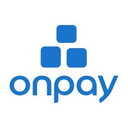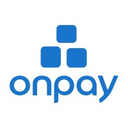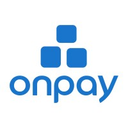OnPay vs QuickBooks Payroll (2026 Comparison)

OnPay offers a user-friendly payroll solution with comprehensive features for small businesses. Its reliable customer support and competitive pricing make it an attractive choice for those seeking simplicity and efficiency.
- User-friendly interface for easy navigation.
- Comprehensive payroll features for small businesses.
- Reliable customer support with quick response times.
- Limited project management capabilities.
- Fewer integrations compared to competitors.
Free plan?
NoStarting price
$46 per month
QuickBooks Payroll provides advanced payroll features and seamless integration with QuickBooks accounting. Its robust security measures and comprehensive tools make it ideal for businesses with complex payroll needs.
- Seamless integration with QuickBooks accounting.
- Advanced payroll features for complex needs.
- Robust security measures for data protection.
- Higher cost compared to other payroll solutions.
- Longer wait times for customer support.
Free plan?
YesStarting price
$42.50 per monthWhat is OnPay?
OnPay is a comprehensive payroll solution designed to simplify payroll processing for small to medium-sized businesses. It offers features like automated tax filings, employee self-service, and benefits management. OnPay helps businesses streamline their payroll operations, ensuring accuracy and compliance with tax regulations. With its user-friendly interface, OnPay makes it easy for business owners to manage payroll without needing extensive accounting knowledge, saving time and reducing errors.
What is QuickBooks Payroll?
QuickBooks Payroll is a robust payroll software that integrates seamlessly with QuickBooks accounting software. It provides features such as automatic payroll tax calculations, direct deposit, and employee self-service portals. QuickBooks Payroll is ideal for businesses that already use QuickBooks for accounting, as it offers a unified platform for managing both payroll and financial records. This integration helps businesses maintain accurate financial data and simplifies the payroll process, making it a popular choice for small to medium-sized enterprises.
Pros and Cons of OnPay vs QuickBooks Payroll

Pros & Cons of OnPay
- OnPay's interface is designed with simplicity in mind, making it easy for users to navigate and manage payroll tasks without extensive training. This is particularly beneficial for small business owners who may not have a dedicated payroll specialist.
- OnPay offers a wide range of payroll features, including automated tax filings and employee self-service portals, making it a versatile solution for small to medium-sized businesses looking to streamline their payroll processes.
- OnPay provides excellent customer support, with a dedicated team available to assist users with any issues or questions. This ensures that businesses can rely on timely and effective support when needed.
- OnPay's project management capabilities are limited, making it less suitable for businesses that require detailed project tracking and management. This may be a drawback for companies with complex project needs.
- OnPay offers fewer integrations compared to some of its competitors, which may limit its functionality for businesses that rely on multiple software solutions. This could be a consideration for companies looking for a more integrated approach.

Pros & Cons of QuickBooks Payroll
- QuickBooks Payroll integrates seamlessly with QuickBooks accounting software, providing a unified platform for managing both payroll and financial records. This integration simplifies data management and ensures accuracy across systems.
- QuickBooks Payroll offers advanced payroll features, including time tracking and project management tools, making it a comprehensive solution for businesses with complex payroll needs. This makes it ideal for companies looking for a more robust payroll system.
- QuickBooks Payroll benefits from Intuit's extensive security infrastructure, providing robust measures to protect sensitive payroll data. This ensures that businesses can trust their data is secure and protected from potential threats.
- QuickBooks Payroll is priced higher than some other payroll solutions, which may be a consideration for businesses with limited budgets. However, the advanced features and integration capabilities may justify the cost for some companies.
- Some users have reported longer wait times for customer support during peak periods, which may be a drawback for businesses that require immediate assistance. This could be a consideration for companies that prioritize quick support response times.
OnPay vs QuickBooks Payroll: At A Glance
Value to Price
OnPay offers a competitive pricing structure that provides excellent value for small to medium-sized businesses. It includes essential features like automated tax filings and employee self-service at a reasonable cost. QuickBooks Payroll, while slightly more expensive, offers a broader range of features and seamless integration with QuickBooks accounting software, making it a better choice for businesses already using QuickBooks.
Ease of Use
OnPay is known for its user-friendly interface, making it easy for business owners to manage payroll without extensive accounting knowledge. QuickBooks Payroll also offers an intuitive interface, but its integration with QuickBooks accounting software can make it slightly more complex for new users. However, for those familiar with QuickBooks, it provides a seamless experience.
Functionality
OnPay provides essential payroll functionalities, including automated tax filings and benefits management. QuickBooks Payroll, on the other hand, offers more advanced features such as time tracking and project management, making it a more comprehensive solution for businesses with complex payroll needs.
Scalability
OnPay is designed to scale with small to medium-sized businesses, offering features that grow with your company. QuickBooks Payroll, with its advanced features and integration capabilities, is better suited for businesses looking to scale rapidly and manage more complex payroll operations.
Integrations
OnPay offers a range of integrations with popular business tools, but QuickBooks Payroll excels in this area with its seamless integration with QuickBooks accounting software. This makes QuickBooks Payroll a more attractive option for businesses already using QuickBooks.
Customer Support
OnPay provides excellent customer support, with a dedicated team available to assist users. QuickBooks Payroll also offers strong customer support, but some users have reported longer wait times during peak periods. Overall, both tools provide reliable support, but OnPay has a slight edge in responsiveness.
Security
Both OnPay and QuickBooks Payroll prioritize security, offering robust measures to protect sensitive payroll data. QuickBooks Payroll, however, benefits from Intuit's extensive security infrastructure, providing an added layer of protection for users.
Overall Rating
OnPay is a solid choice for small to medium-sized businesses looking for a straightforward payroll solution. QuickBooks Payroll, with its advanced features and seamless integration with QuickBooks accounting software, is better suited for businesses with more complex payroll needs.
OnPay vs QuickBooks Payroll: A Detailed Breakdown of Key Features
Automated Tax Filings
OnPay offers a reliable automated tax filing feature that ensures compliance with federal and state regulations. It's a lifesaver for small businesses that want to avoid the hassle of manual tax calculations. QuickBooks Payroll takes it a step further with more advanced tax management tools, making it ideal for businesses with complex tax needs. If you need a more comprehensive tax solution, QuickBooks Payroll is the way to go.
Employee Self-Service
OnPay provides a user-friendly employee self-service portal that allows employees to access their pay stubs and tax documents easily. QuickBooks Payroll offers a similar feature but with more customization options, making it a better fit for businesses that require more flexibility in managing employee access. If customization is a priority, QuickBooks Payroll is the better choice.
Direct Deposit
Both OnPay and QuickBooks Payroll offer direct deposit features, but QuickBooks Payroll provides faster processing times and more options for scheduling payments. This makes QuickBooks Payroll a better option for businesses that need to manage cash flow more efficiently. If speed and flexibility in payment processing are important, QuickBooks Payroll is the superior choice.
Time Tracking
OnPay offers basic time tracking features, which are sufficient for small businesses with straightforward payroll needs. QuickBooks Payroll, however, provides more advanced time tracking tools that integrate seamlessly with its payroll system, making it ideal for businesses with complex time management requirements. If you need advanced time tracking capabilities, QuickBooks Payroll is the better option.
Project Management
OnPay's project management features are limited, making it less suitable for businesses that require detailed project tracking. QuickBooks Payroll offers more robust project management tools, allowing businesses to track project costs and manage budgets effectively. If project management is a critical aspect of your business, QuickBooks Payroll is the better choice.
Benefits Management
OnPay provides a comprehensive benefits management system that simplifies the process of managing employee benefits. QuickBooks Payroll offers similar features but with more integration options, making it a better fit for businesses that need to manage benefits across multiple platforms. If integration is a priority, QuickBooks Payroll is the superior choice.
Pricing Comparison of OnPay and QuickBooks Payroll
To assist you in making an informed choice, we’ve outlined the pricing plans and essential features of OnPay and QuickBooks Payroll. This comparison will highlight the best option for managing your payroll needs.

OnPay Pricing Plans
- Unlimited pay runs and schedules for flexible payroll management.
- Federal, state, and local tax filings are included for compliance.
- Pay workers in multiple states without additional charges.
- Expert support available via phone, chat, and email for assistance.

QuickBooks Payroll Pricing Plans
- Auto Payroll feature to ensure timely and accurate payroll processing.
- Employee portal for easy access to pay stubs and tax forms.
- Track income and expenses to maintain financial clarity.
- Invoice and accept payments to streamline cash flow management.
- Run enhanced reports to gain deeper insights into business performance.
- Manage bills and enter time to streamline operations.
- Connect up to 3 sales channels for expanded reach.
- Includes 3 users to facilitate team collaboration.
- 24/7 expert product support for uninterrupted assistance.
- Track project profitability to optimize resource allocation.
- Track inventory to manage stock levels effectively.
- Includes 5 users to support larger teams.
Our Rating Methodology
We thoroughly evaluate each payroll software, focusing on key factors like functionality, ease of use, and integrations. By analyzing user reviews and conducting in-depth testing, we ensure our recommendations meet diverse business needs. Each factor is weighted by importance to deliver a reliable final rating, helping you make informed decisions.
OnPay or QuickBooks Payroll: Which One Matches Your Business Needs?
Choose OnPay If You Need ...
- User-friendly payroll solution
If you are a small business owner looking for a user-friendly payroll solution, OnPay is an excellent choice. Its intuitive interface and comprehensive features make it easy to manage payroll tasks without extensive training.
- Comprehensive features for small businesses
If you need a comprehensive payroll solution with essential features, OnPay is a great option. It offers automated tax filings, employee self-service, and benefits management, making it ideal for small to medium-sized businesses.
Choose QuickBooks Payroll If You Need ...
- Advanced payroll features
If you require advanced payroll features and seamless integration with QuickBooks, QuickBooks Payroll is the better choice. Its robust tools and integration capabilities make it ideal for businesses with complex payroll needs.
- Seamless integration with QuickBooks
If you are already using QuickBooks for accounting and need seamless integration, QuickBooks Payroll is the perfect fit. It provides a unified platform for managing both payroll and financial records, ensuring accuracy and efficiency.
Frequently Asked Questions
 What are the key differences between OnPay and QuickBooks Payroll?
What are the key differences between OnPay and QuickBooks Payroll?
 Which software is better for small businesses?
Which software is better for small businesses?
 How do the pricing plans compare between OnPay and QuickBooks Payroll?
How do the pricing plans compare between OnPay and QuickBooks Payroll?
 Can I integrate OnPay with other business tools?
Can I integrate OnPay with other business tools?
 Is QuickBooks Payroll suitable for businesses with complex payroll needs?
Is QuickBooks Payroll suitable for businesses with complex payroll needs?
 How does customer support compare between OnPay and QuickBooks Payroll?
How does customer support compare between OnPay and QuickBooks Payroll?

Martin Lunendonk
Martin Lunendonk is a senior tech writer specializing in website builders, web hosting, and ecommerce platforms. With a background in finance, accounting, and philosophy, he has founded multiple tech startups and worked in medium to large tech companies and investment banking, bringing deep expertise and reliable insights to his software reviews.



